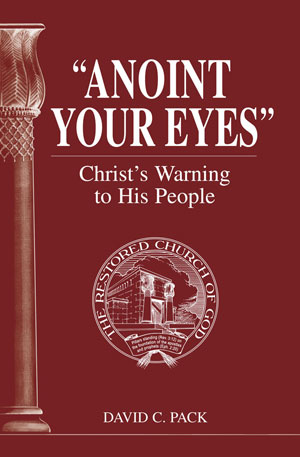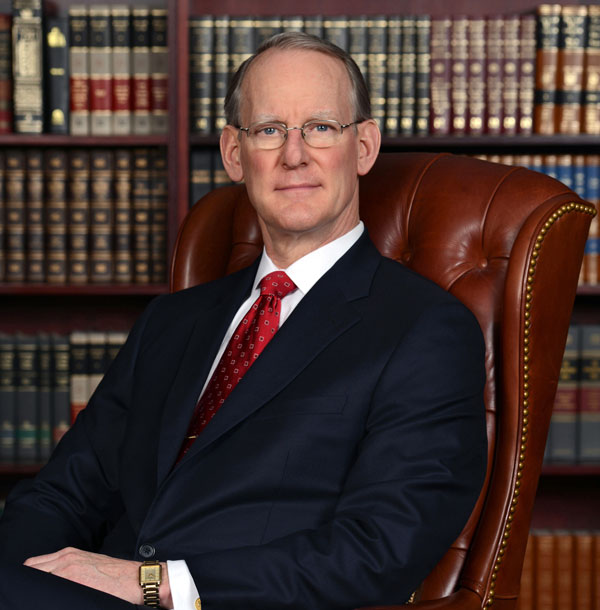All of God’s people live in a world literally defined by the spirit of compromise. There is almost no end of ways that Satan, the world and human nature will work on God’s people to get them to compromise every truth, law and principle in the Bible. While many still somewhat recognize this regarding sin—albeit now to a much lesser degree than in times past—many have not ever fully recognized its all-important application to not compromising true doctrine at the end of the age.
Mr. Armstrong understood and taught the Church of God not to compromise—to hold to the truth—and one of the doctrines he taught the Church was that true doctrine only enters the Church through apostles. Realize that this truth must first be rejected before any other truth can be overturned.
Practice telling yourself Mr. Armstrong’s words, quoted earlier: “I have NEVER compromised with God’s TRUTH—regardless of the cost or the circumstances. I never shall!” and “I won’t compromise—not even ‘just a little.’”
I have followed the practice of periodically repeating these phrases to myself for many years. Though I have not done this perfectly, it has served me well!
II Peter 3:18—and the Great Misunderstanding!
The apostasy should have taught all of us that there were dozens of methods that the apostates used to seduce the Church into hundreds of false doctrines. I have listed 43 of these tricks and ploys near the front of my book There Came a Falling Away.
Some of these gimmicks are practiced in the splinters with even greater skill than that of the WCG’s false leaders. The most popular—and by far the most effective—has been the gross misuse of II Peter 3:18: “But grow in grace, and in the knowledge of our Lord and Savior Jesus Christ.”
This passage is often referred to in short with the phrase “We must grow in knowledge.” And those invoking this scripture almost always have doctrine in mind.
This verse is NOT talking about doctrine, but rather knowledge—and this is the Greek word used! A simple review reveals this. The word used here for “knowledge” is gnosis, meaning “(the act of) knowing, i.e. (by implication) knowledge.” This is not a hard word to understand. Almost everyone learns some kind of knowledge (gnosis) every day of his life. Of course, it is “the knowledge of Jesus Christ” that is the most important knowledge to learn. But make no mistake—this verse is talking about “knowledge,” not “doctrine.”
On the other hand, the Greek word for “doctrine,” found dozens of times throughout the New Testament (as is “knowledge”), is didache. This word means “instruction (the act or the matter), doctrine (what has already been taught).” Take special note of the phrase “already been taught.”
Once again, the Greek word for “doctrine” (didache) is totally different than the one for “knowledge” (gnosis). I cannot state this strongly enough. There is a very clear difference between knowledge and doctrine.
Please, for your own sake—get this straight!
General Epistle
The background and purpose of Peter’s epistles is critical to appreciate. Each of his letters is what is known as a “general epistle.” In effect, they were open letters to all brethren in the Church throughout the ages. Imagine God inspiring Peter to tell individual Christians and leaders, everywhere—for all time—to grow in doctrine through what would have to be, presumably, their own Bible research.
This is an absolutely ludicrous idea, and would be the surest way to have complete, absolute chaos and confusion—not to mention horrific division—throughout the Church, and in every era! Yet, this is the very premise upon which so many unqualified teachers are justifying departure from truth straight into error—directly away from “what has already been taught”! Like the very apostates themselves, every splinter leader almost routinely introduces outright heresies in the name of “growing in knowledge.” (Is it any wonder that there are 300 disagreeing splinters and slivers, with more appearing all the time?)
Not wanting to seem inflexible or resistant to growth, most of their members almost eagerly swallow their line.
Do not fall for such deceit—and stupidity! Anyone so ignorant of the Bible that they confuse didache with gnosis is hardly qualified to teach you the truth about anything—period! Such people need to first grow in their knowledge of the very word “knowledge.” Then they ought to spend their time focusing on, proving and holding fast to true doctrines they obviously never proved.
Mr. Armstrong repeatedly told new people learning the truth for the first time to “prove all things, hold fast that which is good” (I Thes. 5:21). Apparently, only a few bothered to do this with all of God’s doctrines. Also apparently, the vast majority in the Church may have almost never done it.
But there is a middle group, consisting of those who seem to have “proved some things,” leaving themselves only able to “hold fast some things which are good.” These people have really put themselves in a dilemma. They are insufficiently prepared to resist the persuasions of those seeking to “turn them to fables” (II Tim. 4:4). It then becomes easy to rationalize their weak doctrinal understanding and commitment by simply asserting, “Oh well, Mr. Armstrong changed doctrines, so I am just growing in knowledge. Besides, my leader told me we should change what Mr. Armstrong taught and I choose to believe him.” What has really happened is that such people’s “private parts” have just been further exposed. (Again, the literal meaning I reference here had been proven by this point in the book, âAnoint Your Eyesâ â Christâs Warning to His People. The reader can go to the book for this proof.)
Incredible! In effect, they just took their underclothes off—and pronounced that they now look better. Such blindness!
Here is a worse irony about such people. They often talk as though they have actually outgrown the “somewhat primitive,” or others will say “simplistic,” understanding that they like to dismiss as having “worked well for Mr. Armstrong in his time.” Can you imagine the sheer gall—and utter arrogance—of people walking around shamelessly naked (Rev. 3:17), while asserting that they have outgrown Mr. Armstrong?
Let’s put this another way. You cannot “grow in knowledge” from what you have already proven! This is literally impossible to do.
Proof is proof is PROOF!
Obviously, vast numbers of brethren never fully proved God’s truth. As a result, coupled with now being lower in supply of the “Spirit of truth”—the problem of both the foolish and wise virgins—they lazily claim that they have “grown” to see “new truth”—as they march straight into error. This could be a false gospel, points of prophecy, birthday-keeping, the definition of the Church and Body of Christ, the truth about how God’s government looks and works, among so many others.
Once again, you cannot grow out of things that you have proven. I repeat: You cannot grow out of, or beyond, matters you truly proved!
Those who accept false teachings, while calling them “growth,” are trumpeting that they never really researched and carefully proved what they are now throwing aside! They are virtually crowing that they believed neither God nor Mr. Armstrong—when he was alive—regarding I Thessalonians 5:21 and Romans 12:2.
How many would do this if they saw their actions in this light?
Appalling Ignorance
On a side note, I have been appalled at the outright biblical ignorance of many who I thought were giants in the faith. Circumstances forced me to observe this. It was as though some of them could barely seem to find the book of Matthew—let alone resist false doctrine.
Believe me! I have sat in (Council of Elders) meetings by the hour with evangelists and senior pastors who almost appeared to be biblical illiterates. Some only rarely opened their Bibles, and this is when they had even brought them to meetings. I do not say this to put them down, but to recognize that Christ said, “By their fruits you know them.”
Do not be afraid to apply Christ’s statement in this regard! Do not be afraid to KNOW the fruits of your leaders.
Sadly, many of these “giants” learned to parrot Mr. Armstrong while apparently never actually building their house on the rock of Christ’s words, taught to them by Mr. Armstrong. It is no wonder that so many have failed in their responsibility to fulfill Titus 1:9, found in the middle of the qualifications for ordination into the ministry: “Holding fast the faithful word as he has been taught, that he may be able by sound doctrine both to exhort and to convince [convict] the gainsayers”—and, I would add, save a great many more people from being unnecessarily swallowed by compromising seducers pursuing a personal doctrinal agenda.
The apostle Paul warned of “dishonest” ministers who “handle the word of God deceitfully” (II Cor. 4:2), because they, like their students who are willing to believe them, “received not the love of the truth” (II Thes. 2:10).
God’s true servants and ministers never—under any circumstances—follow these practices! They do not ever spin scriptures toward their own end.
In most cases, if one is properly trained and sufficiently grounded in the truths of the Bible, it is quite easy to see through and expose the deceptive logic misapplied to a verse, and to correctly explain it.
Now ask yourself: Has my pastor sought to protect me from gainsayers? In MYSTERY OF THE AGES, Mr. Armstrong wrote, “It is the duty of Christ’s true ministers (and how scarce today) to protect the begotten but yet unborn saints from false doctrines, from false ministers.”
This book (“ANOINT YOUR EYES“) is part of my responsibility to fulfill this duty.
I urge you to recognize that II Peter 3:18 has become the banner—but really the ruse—for introducing wrong doctrine. While everyone wants to and should be concerned with the need to continually grow in “the knowledge of Jesus Christ,” this verse has become an excuse for accepting false doctrine—a means for labeling plain false teaching as “growth.”
Now consider this for a moment, so that this vital point cannot be missed. Every minister will surely tell you that he hopes all of his sermons have brought listeners more knowledge—that people were able to go home aware of new aspects about already established doctrines—that they never saw in the same way before. I certainly do. This is basic and easy to see.
Try this little experiment. The next time you hear your pastor preach a basic, routine sermon, ask him if it involved new doctrine. He will almost invariably answer, “No!” Next, ask him if he hoped that the congregation learned any new knowledge. He will most certainly answer, “Yes!” Then you may wish to respectfully ask him if he knows the difference!
Growing in knowledge has never been an equation with changing doctrine—without a living apostle guiding the process. Another way to think of this is that Mr. Armstrong knew if he grew in Bible knowledge, the result would be the Church would grow in doctrine to be taught and held fast. I challenge any member or minister to find where Mr. Armstrong said otherwise—or that the Bible does!




















